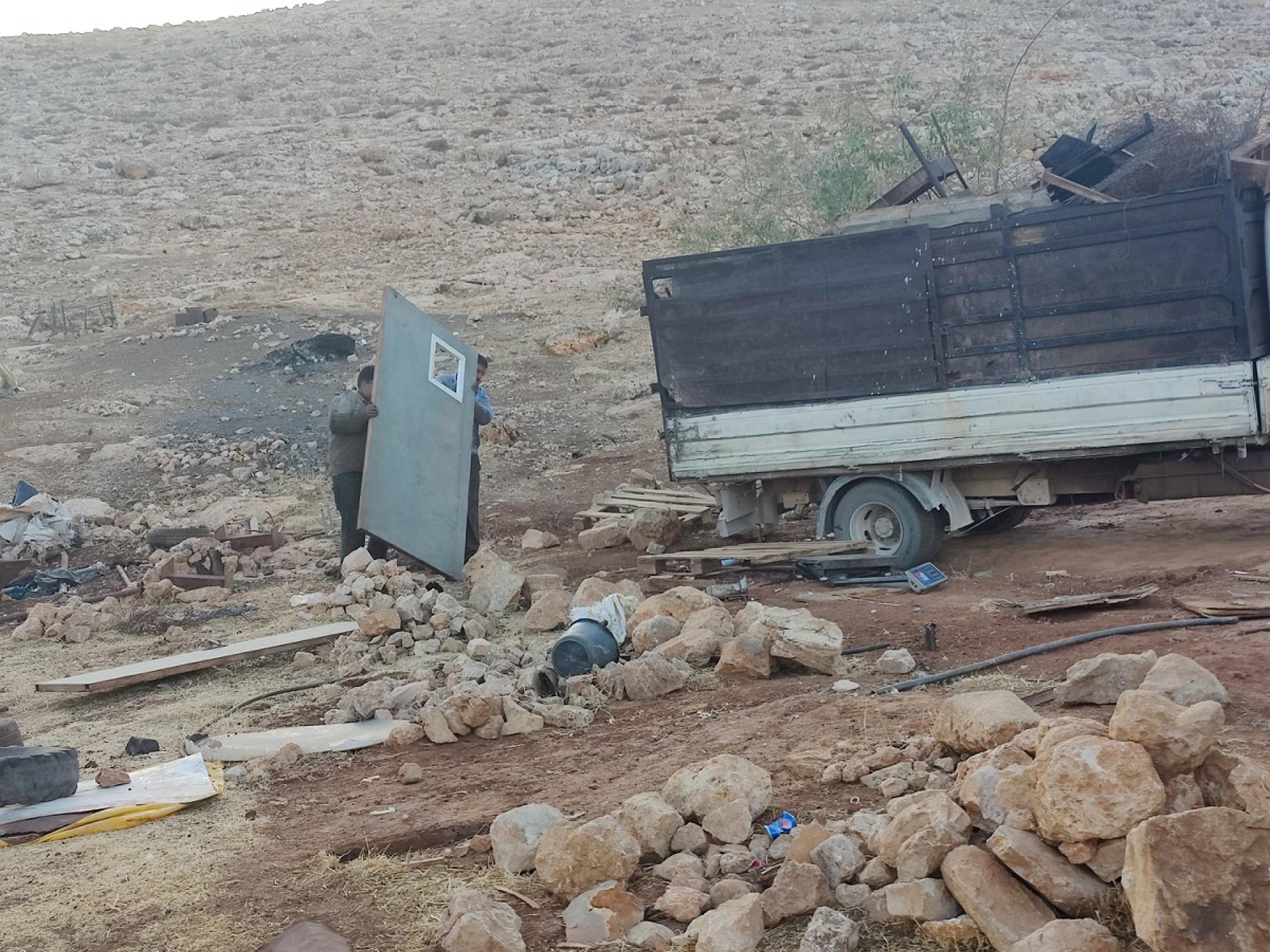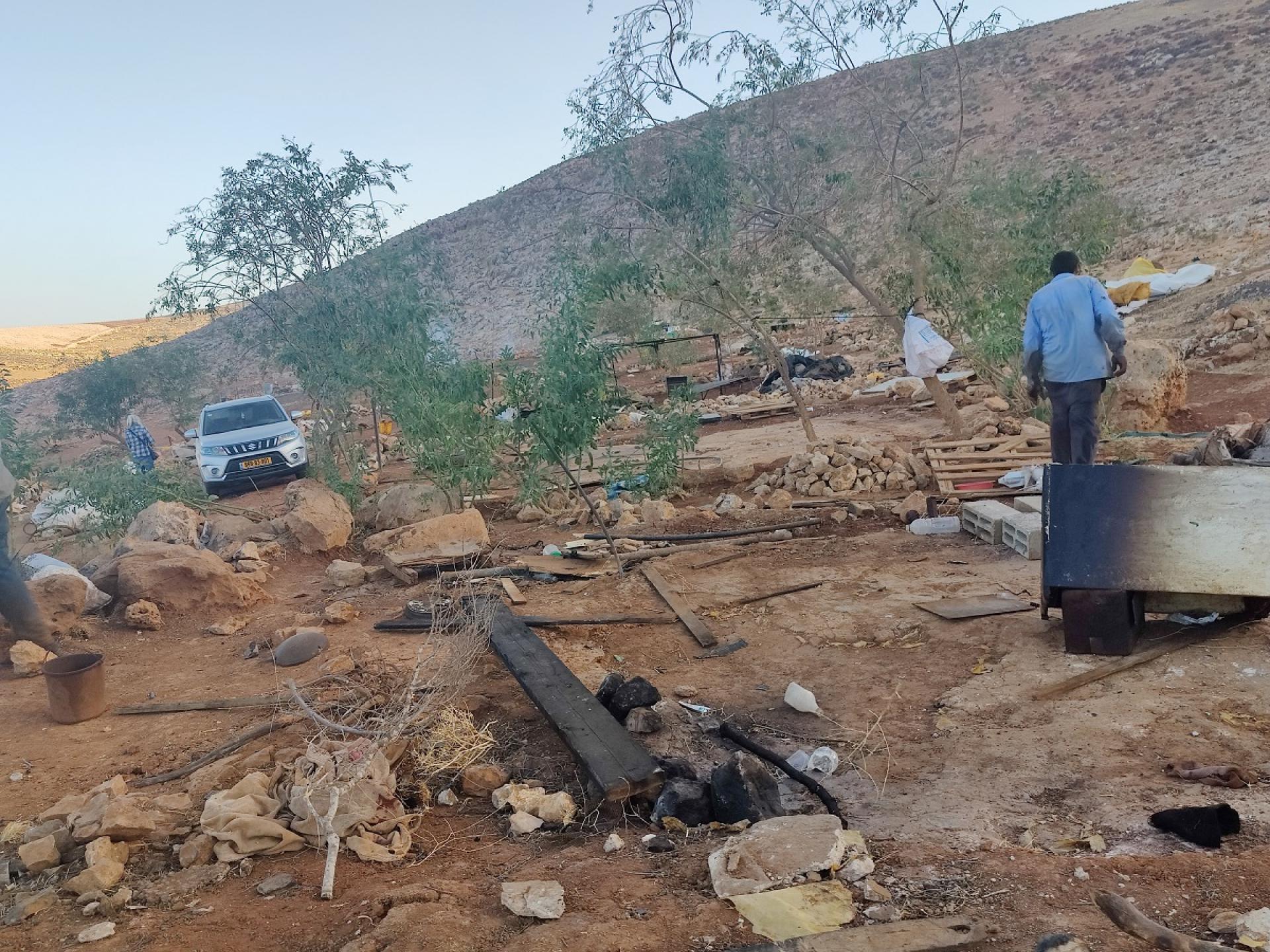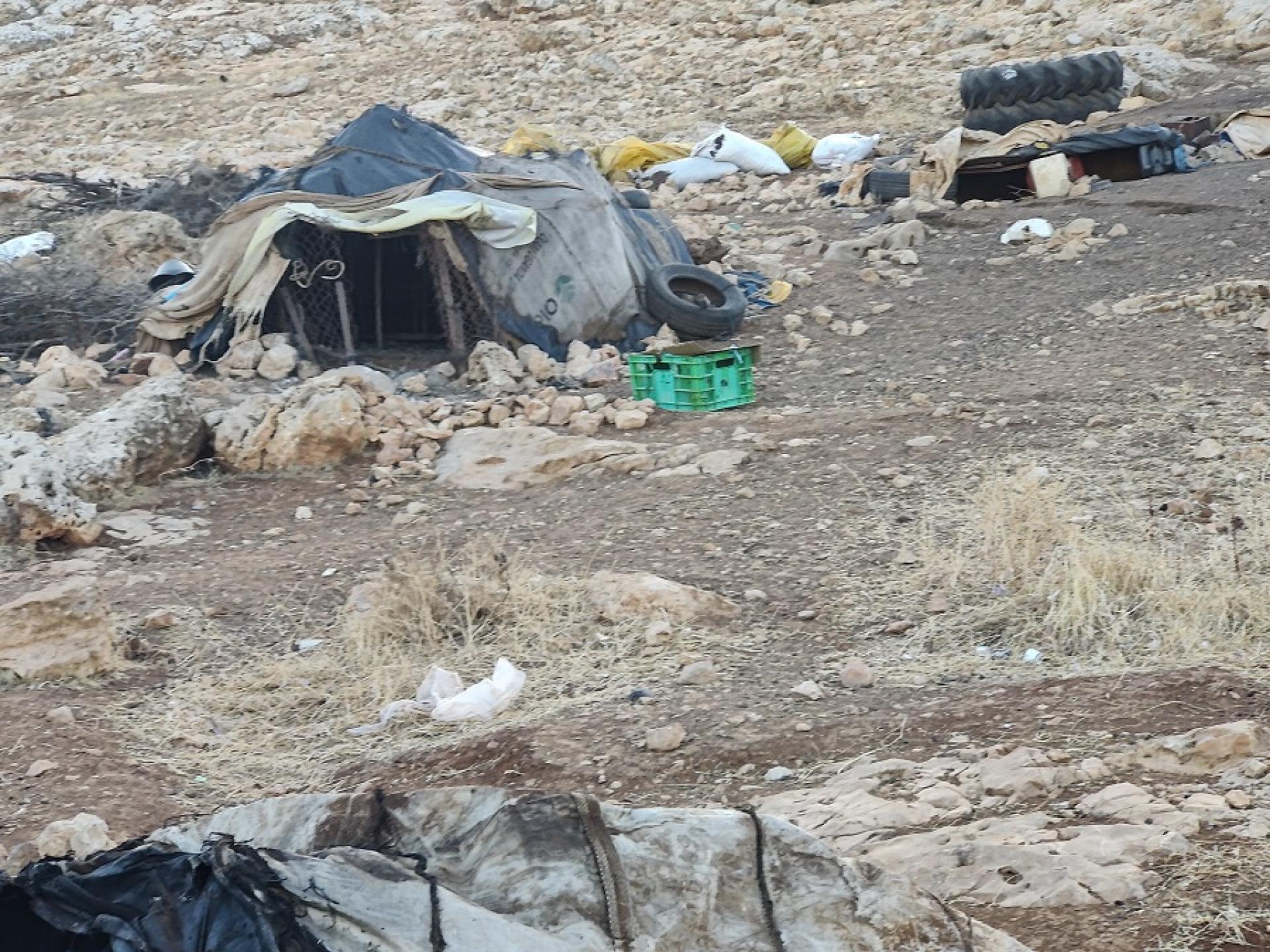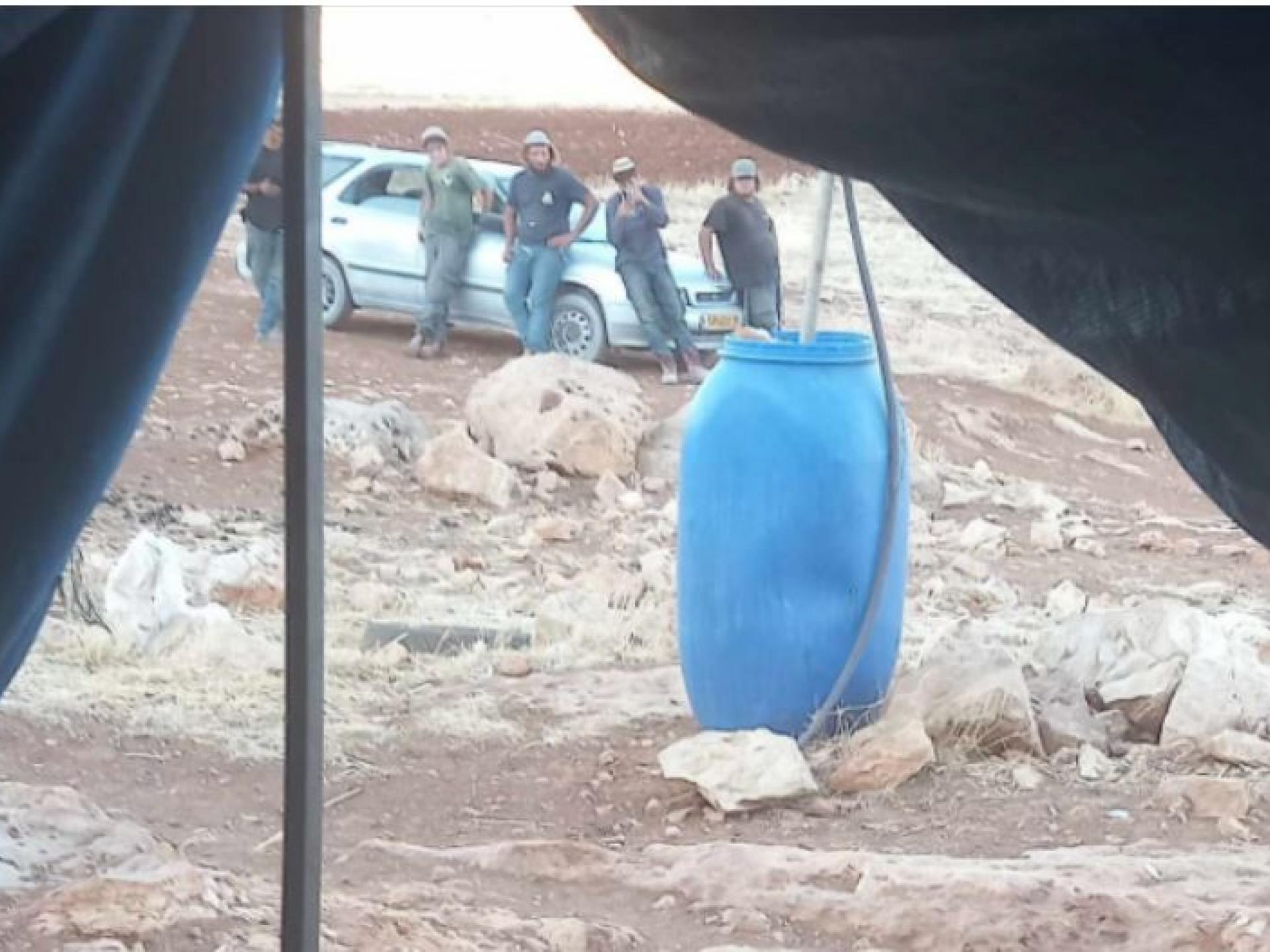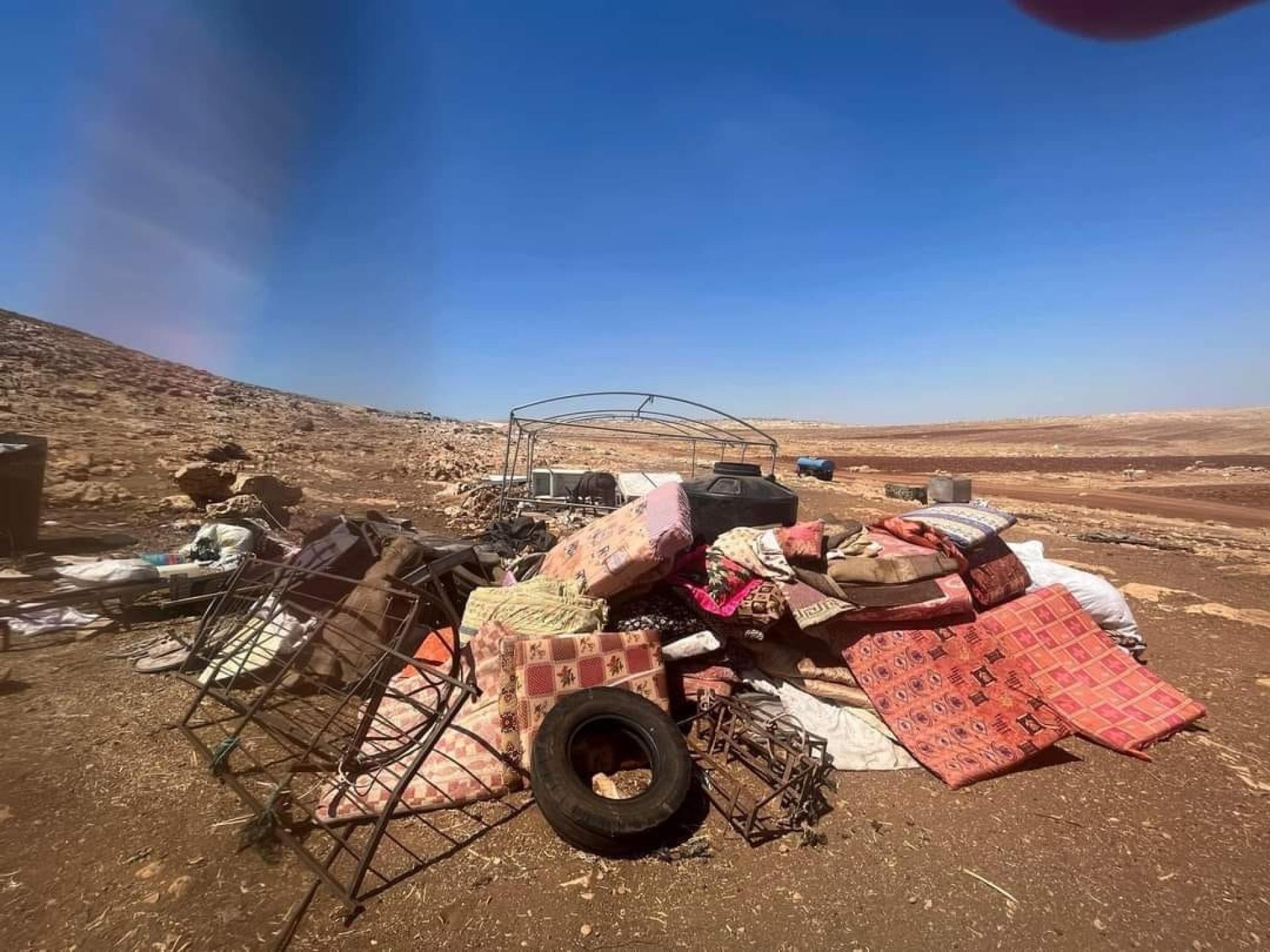Kaboun , Jordan Valley: the purification was successful here
There is plenty of room between the sea and the river, but I don’t even have room for a home.” (Said by a Kaboun inhabitant. Cited by Avishai Mohar)
The evening is here. We stand with Abu Sliman by the remains of his residential tent. Three cars filled with colonists pass by, yelling joyfully. Our presence, Israelis, stops them from stopping and carrying out their usual harassment. We beg Abu Sliman to join his brother and not stay here alone. He says, “Yes, I’m going”, but cannot. He sits on a rock, wringing his fingers, tears in his eyes. I choke. My heart is rent with pain at his sight. Still – I will be sleeping in my safe home tonight, whreas Abu Sliman, his wife and daughters, have no home any more. It’s not another Nakba. It is that continued Nakba, which may not be mentioned in Israeli circles.
This expulsion is not just the work of colonists. The State of Israel is behind them, acting through the colonist “hills youth”. The army and the police, who harass the shepherd communities in the Palestinian Jordan Valley until they finally leave. When they desert their homes out of sheer desperation, the state will take over the lands and create more and more colonies. The guilt of this crime is shared by all the state’s citizens – who remain silent, enable, yell “Shame!” and “Democracy” in the streets but then say, “Don’t mentioned occupation, it is irrelevant right now.” The US is also guilty, slapping Israel lightly o the wrist – and the European Union who only two years ago financed the building of a schoolhouse here – and still has friendly relations with the authorities who have chased the schoolchildren out. The slack condemnation or lack of response are equal to silent endorsement. Thus, guilty are all those who did not stop the expulsion of Ras A-Tin, En Samiya and Kaboun (all in the past year). Moreover – they do not stop the next expulsion that is already in the works on the hilly colonist outposts and in the halls of the Knesset, Israel’s Parliament.
I am broken to the point that I am unable to describe the terrible sight. I added the words of Doron Meinert (reserves General) who accompanied the people on their last day upon the area where they had spent their entire lives:
“A pile of mattresses and bedclothes lies on the dusty ground in the seething heat of August, mixed with parts of sheds and tires. Seven brothers are taking apart the compound their grandfather built 43 years ago. In this heat, they take down metal sheets from the sheep pens and load the tractor wagon. The youngest brother takes out the flock to graze for the last time. Tomorrow, they will leave for their new place where there is no ample space to graze. They will have to sell most of the flock and look for another source of livelihood.
The father, who arrived here as a boy, is absent. He cannot watch losing his home. The women, too, are absent. The home is no longer a home. The neighbor is also getting ready to leave. He is selling his goats and is left only with his sheep. Traders take advantage of the situation and buy cheap. He has not been eating for three days, living on coffee and cigarettes. His daughters and sons invite us to share their meal, a wonderful Palestinian dish (mansaf) eaten out of a joint tray, sitting on the mat. The food was prepared by the women who are still there, the tray is passed to the women’s tent after the men have finished eating and there is still some left.
The daughters want to fight, the father tells us. They do not want to leave, but there is no choice. We sit outside the tent. It is getting dark and a pleasant breeze is blowing. In excellent Hebrew the father and one of the sons mourn the loss of home, of a whole lifestyle. In spite of the poor appearance and fundamental material culture, for these people nothing can replace the freedom of life in the open.
“One of the times the children from the colony that overlooks us went into the tent, I called the Israeli police”, the father says. “Did anyone get hurt?” asked the woman on the line. “No, not yet.” An army officer came, I showed him videos. “Were you hurt?” he asked. “They entered my home, came into the tent of my wife and daughters. Threatened, took telephones, kicked furniture, threw stones at the sheep. What would you do if this happened in your home, if your wife and children were harassed?” ‘I’ll look into it’, said the officer. He took the videos and left. Since then, he has already finished his reserves duty. I called up my acquaintance at the Civil Administration . “I’m on leave”, he said.
. “I’m on leave”, he said.
I shall not stay here and let my children and wives be hurt. Their aim is obvious. First, they only harass the flock and grazing ground. Then they enter residences. If we do not leave, the next phase is clear. No one protects me. When you (human rights activists) are here, they do not come, but you cannot be here all the time. The colonists want to chase us out, and the army is with them. There is no one to talk to. No choice.”
The human birds of prey watch us from the hill. Occasionally they fly a drone. Send an ATV for a triumphal round on the dirt track next to the residences. It’s Sabbath Eve. They wear white shirts. Between praying and the festive meal. They do not enter for we Israelis are there. They’ll wait for the right time to hurry up those late to leave. Complete the ethnic cleansing. For we are the Chosen People, Chosen by God.
The next day I visited the deserted schoolhouse of a nearby community that left under similar circumstances several months ago. All the doors and windows are broken in. The tables are smashed. Study materials thrown on the floor. The wall sports a poster describing a traffic light. Red yellow and green. Red red red.”
12 families left this evening to find a piece of ground on which to erect their tents. Obviously, they realize that greedy Israel will expel them from there, too. Behind the quarries of Kochav Ha-Shachar colony, every is empty as far as the eye can see. Only very far away at the top of the hill, one sees a white spot, a home, a colonist outpost erected here several months ago. Believe me, 20 outposts and another 20 shepherd communities like Kaboun could live here far from one another, without any friction.
But the State of Israel wants it all. Everything!!

